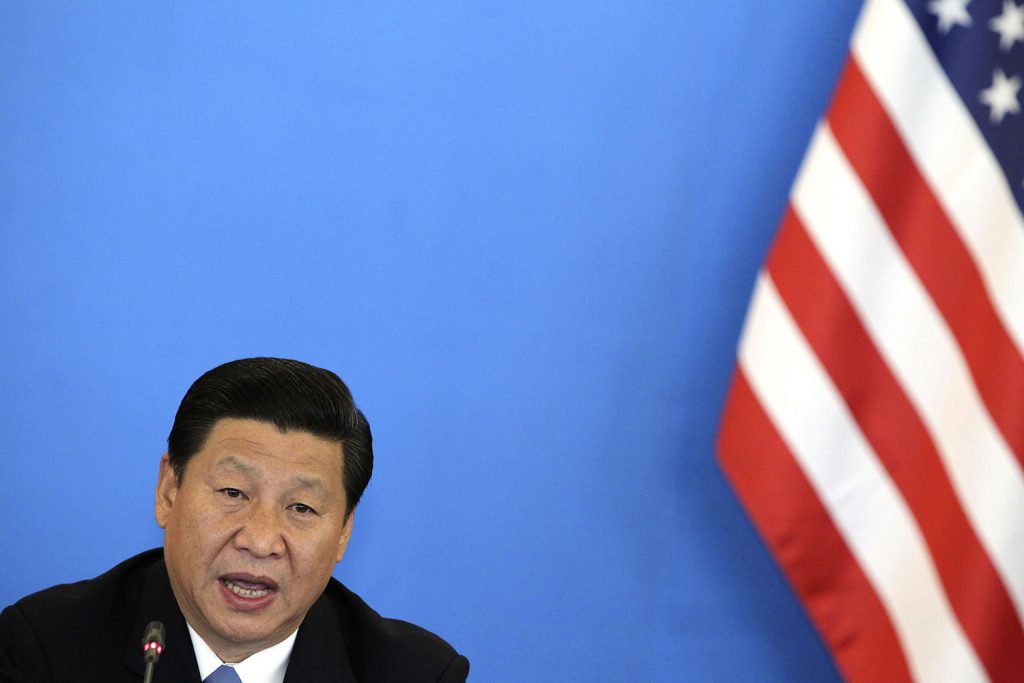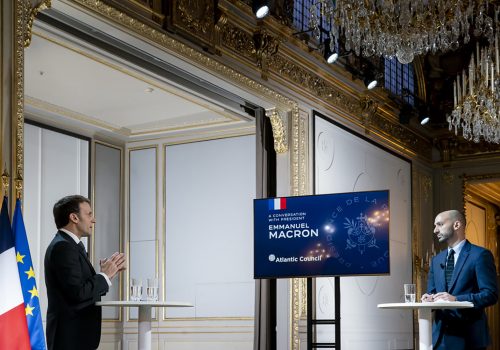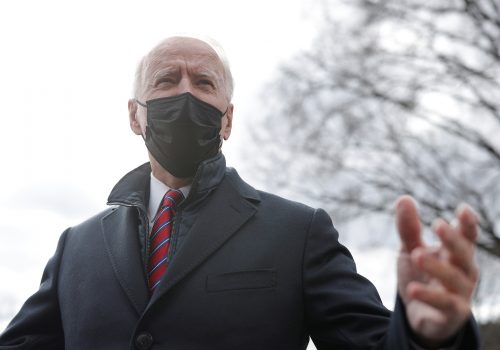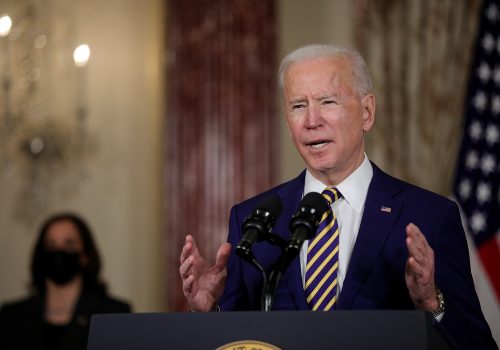The fierce global debate set off this week by a thought-provoking paper—“The Longer Telegram: Toward a new American China strategy”—has underscored the urgency and difficulty of framing a durable and actionable US approach to China as the country grows more authoritarian, more self-confident, and more globally assertive.
The 26,000-word paper, published simultaneously by the Atlantic Council and in shorter form by Politico Magazine, has served as a sort of Rorschach test for the expert community on China. The reactions have ranged between critiques from those who found the paper’s prescriptions too provocative, to praise from those who lauded its ground-breaking contributions.
Beijing took notice, not least because of the author’s apparent familiarity with Chinese Communist Party (CCP) politics and focus on President Xi Jinping. China’s Foreign Ministry spokesperson accused the anonymous author of “dark motives and cowardliness” aimed at inciting a “new Cold War.”
Writing in the realist and conservative National Interest, former CIA China analyst Paul Heer seemed to agree, deeming the singular Xi emphasis “a profoundly misguided if not dangerous approach.”
Financial Times columnist Martin Wolf agreed with Anonymous that China “increasingly behaves like a rising great power ruled by a ruthless and effective despot,” but his critique was that the author’s myriad goals aren’t achievable due to China’s economic performance and untapped potential.
Get the Inflection Points newsletter
Subscribe to Frederick Kempe’s weekly Inflection Points column, which focuses on the global challenges facing the United States and how to best address them.
Having digested the most spirited debate evoked by any of the growing industry of China strategy papers, I come down on the side of Senator Dan Sullivan (R-AK) who lauded the paper during an extraordinary speech on the Senate floor.
Sullivan’s credibility grows out of his history; he’s a Marine veteran, former Alaska attorney general, and former National Security Council and senior State Department official dealing with business and economy.
″‘The Longer Telegram,’ while not perfect,” he argued, standing beside a blow-up reproduction of the paper’s cover balanced on an easel, “sets out what I believe is certainly one of the best strategies I have read to date about how the United States needs to address this significant challenge that we will be facing for decades.”
“I hope my colleagues, Democrats and Republicans, all have the opportunity to read this, analyze it. For like Kennan’s strategy of containment, our China policy, to be successful, also needs to be very bipartisan and ready to be operationalized for decades.”
The three elements of the approach of “The Longer Telegram” that should stand the test of time are:
- The urgent need to better understand China’s internal policies and political dynamics in order to succeed.
- The reality that a declining United States won’t be able to manage a rising China, irrespective of strategy.
- The focus on reinvigorating and reinventing alliances, not from any sense of nostalgia, but because no policy will succeed that doesn’t galvanize partners in creative new ways.
Let’s take each of these priorities in turn.
First, the most innovative and controversial idea contributed by “The Longer Telegram” is its focus on China’s leader and his behavior.
“US strategy must remain laser focused on Xi, his inner circle, and the Chinese political context in which they rule,” the paper argues. “Changing their decision-making will require understanding, operating within, and changing their political and strategic paradigm.”
The paper’s most virulent critics took on this Xi focus. Some argued that the author overestimated Xi’s role and others quibbled with the notion that China would become a more cooperative partner under more moderate leadership if Xi were replaced over time.
Others warned that China would regard any US policy focused on Xi as a dangerously escalatory effort at regime change.
Yet those points miss the author’s more significant and irrefutable point: No American strategy toward Beijing can succeed without a better understanding of how China’s decision-making unfolds.
“The core wisdom of Kennan’s 1946 analysis was his appraisal of how the Soviet Union worked internally and the insight to develop a US strategy that worked along the grain of that complex political reality,” writes Anonymous. “The same needs be done to address China.”
The author’s own informed view is that Xi’s concentration of power, his campaign to eliminate political opponents, and his emerging personality cult have “bred a seething resentment among large parts of China’s Communist Party elite.”
Whether or not you agree with the author’s view that China has underrecognized political fissures and fragilities, the real point is that the US must invest more in understanding such dynamics. One of Beijing’s advantages in the competition is its insight into America’s painfully-transparent political divisions and vulnerabilities.
On the second point, US President Joe Biden’s first foreign-policy speech underscored his alignment with the anonymous author’s second key point. “US strategy must begin by attending to domestic economic and institutional weaknesses,” writes the author.
“We will compete from a position of strength by building back better at home,” Biden said.
Nothing will be more important.
Finally, and this was at the heart of the Biden speech, the author argues that the US needs to galvanize allies behind a more cohesive and coherent approach. That will be hard to pull off, as a great many US partners now have China as their leading trading partner.
Forging common cause among traditional US partners and allies will take an unprecedented level of global engagement and give-and-take—and an acceptance of the reality of China’s economic influence.
Critics singled out other elements of the paper. For example, some called out the author’s appeal for “red lines” in the relationship, on matters ranging from Taiwan to the South China Sea, as particularly perilous.
Others considered the author’s call for greater efforts to peel off Russia from its deepening ties with China as folly.
Yet both would merely be a return to sound strategic practice à la former US Secretary of State Henry Kissinger. The private sharing of red lines can head off miscalculations. Their enforcement can be measured and proportionate.
You also don’t have to love Russian President Vladimir Putin to recognize that Russia’s increasingly close strategic alignment, military cooperation, and intelligence sharing with Beijing has been a profound US foreign policy failure.
We published “The Longer Telegram” at the Atlantic Council, where I am president and CEO, and I admit to a certain bias regarding the paper’s value. I am glad it has stirred a global discussion, with criticisms and positive suggestions.
How we tackle China is a challenge as complex as it is critical. There would be no better time for this debate.
This article originally appeared on CNBC.com
Frederick Kempe is president and chief executive officer of the Atlantic Council. You can follow him on Twitter @FredKempe.
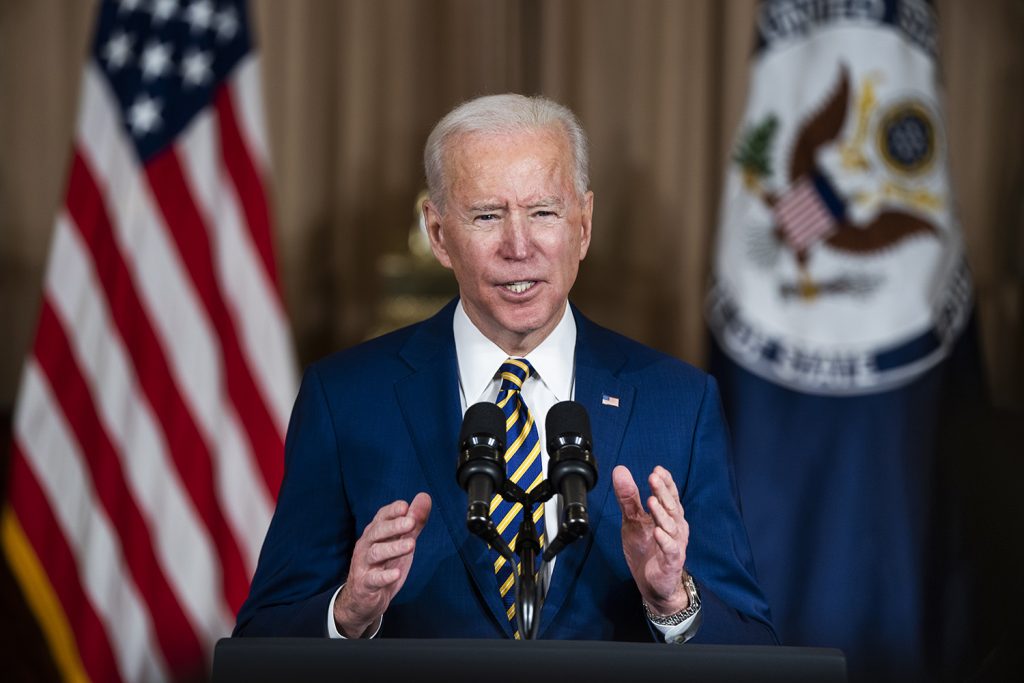
THE WEEK’S TOP READS
This week’s top reads begin with the leading international story of the week: the sentencing of Russian opposition leader Alexei Navalny and what it means for Putin’s Russia.
The New Yorker’s Joshua Yaffa recreates the courtroom drama where Navalny spoke less for the judge and more for history. Thomas Friedman in the New York Times colorfully explores the Biden administration’s strategic dilemma of dealing with Putin’s Russia, where the country of Tolstoy is suspected to have poisoned Navalny’s underwear.
Foreign Policy serves up a collection of advice from five former Republican administration officials, each with compelling experience, for the Biden administration.
The WHO’s chief, in Foreign Policy, and the German newsmagazine Der Spiegel explore the perils of vaccine nationalism.
This week’s must-read comes in Foreign Affairs from former Australian Prime Minister Kevin Rudd, who sees the 2020s as the decade of living dangerously in US-China relations. He proposes a framework for “managed strategic competition” to get both sides through without military confrontation.
#1. PUTIN’S NAVALNY PROBLEM
With Navalny Headed to Prison, Russia’s Political Battle Enters a New Stage
Joshua Yaffa / ATLANTIC COUNCIL
The sentence was a foregone conclusion, as Joshua Yaffa reports in the New Yorker.
A Moscow court, at a little after eight in the evening in the city on Tuesday, sentenced opposition leader Alexei Navalny to two years and eight months in a Russian penal colony. That followed his survival of the Kremlin’s suspected poisoning of him, the unmasking of his would-be murderers, and then his brave (or foolhardy, depending on your point of view) decision to return home.
Navalny’s speech was more for history than the courtroom.
“They are imprisoning one person to frighten millions,” Navalny said. “This isn’t a demonstration of strength—it’s a show of weakness… you can’t lock up millions and hundreds of thousands of people. I hope very much that people will realize this. And they will.”
Yaffa’s rich narrative tells a story not of how Navalny has created his historic myth, but rather how it was the Kremlin that did so. Read More →
#2. PUTIN AS “GEOPOLITICAL STALKER”
Vladimir Putin Has Become America’s Ex-Boyfriend From Hell
Thomas Friedman / THE NEW YORK TIMES
New York Times columnist Thomas Friedman wrestles with the dilemma of Putin’s Russia for the Biden administration, “a new kind of strategic problem for US planners” of a state that lacks dynamism but can still hack US cyber systems and deploy an enormous nuclear arsenal.
“Putin is not very important to us at all,” writes Friedman. “He’s a Moscow mafia don who had his agents try to kill an anti-corruption activist, Aleksei Navalny, by sprinkling a Soviet-era nerve agent, Novichok, in the crotch of his underwear. I’m not making that up! Russia once gave the world Tolstoy, Tchaikovsky, Rachmaninoff, Dostoyevsky… Putin’s Russia will be remembered for giving the world poisoned underwear.”
That’s a deftly crafted paragraph, but Friedman returns to the remaining dangers. Russia expert Leon Aron told him we should prepare “for a possible Crimea-type attempt to ‘seize and annex areas just across Russia’s border with significant ethnic Russian populations, most likely in Estonia or Latvia, to reignite Russian Patriotic fervor and expose NATO as a paper tiger.” Read More →
#3. REPUBLICAN ADVICE FOR BIDEN
Key Republican Lessons for Biden’s Global Agenda
Michael Green, Wess Mitchell, Amanda J. Rothschild, Kori Schake, and Daniel Twining / FOREIGN POLICY
Even as Biden gave his first foreign-policy address as president this week, Foreign Policy brought five former officials from Republican administrations together to share their advice with the new administration.
Michael Green, who served on former President George W. Bush’s National Security Council, urges Biden to “impose strategic discipline on his team, something for which he was not well known in the past,” given the many and potentially conflicting priorities he has laid out.
Wess Mitchell, a senior Trump administration State Department official, argues that Biden should use his “honeymoon” with US allies to overhaul NATO for an era of great-power rivalry with Russia and China.
The other three authors continue in similar vein, including why to build on Trump administration achievements, particularly in the Middle East (Amanda Rothschild); not overlooking security in the shadow of domestic priorities (Kori Schacke); and the challenge of “stewarding like-minded coalitions to tackle new challenges” (Daniel Twining).
This collection is worth reading. Read More →
#4. THE DANGER OF VACCINE NATIONALISM
Vaccine Nationalism Harms Everyone and Protects No One
Tedros Adhanom Ghebreyesus / FOREIGN POLICY
The West’s Greed Could Come Back To Haunt It
Laura Hoflinger, Katrin Kuntz, and Fritz Schaap / DER SPIEGEL
“We are in a race against time,” writes the head of the World Health Organization, Tedros Adhanom Ghebreyesus, in rebuking vaccine nationalism.
Writing in Foreign Policy, the WHO chief brands the current global approach to vaccine production and distribution “morally indefensible… epidemiologically self-defeating and clinically counterproductive.” Read More →
The vaccine race is a geopolitical battle as well, claim Laura Höflinger, Katrin Kuntz, and Fritz Schaap in Der Spiegel. While the West is buying up as many vaccines as they can for themselves, countries like China, Russia, and India are using this scramble as a “one-time opportunity to increase their own influence and political weight in the world for decades to come.” Read More →
#5. “THE DECADE OF LIVING DANGEROUSLY
Short of War
Kevin Rudd / FOREIGN AFFAIRS
Former Australian Prime Minister Kevin Rudd, who is also an Atlantic Council International Advisory Board member, examines what is in store for China’s “grand strategy” and advocates for a framework for “managed strategic competition” between the two superpowers to prevent war from breaking out over the next ten years.
Rudd argues that Xi believes the United States is experiencing a steady, irreversible structural decline, but he worries about Washington lashing out at Beijing in the years before US power finally dissipates. “Xi’s concern is not just a potential military conflict but also any rapid and radical economic decoupling,” writes Rudd.
“Managed strategic competition would involve establishing certain hard limits on each country’s security policies and conduct but would allow for full and open competition in the diplomatic, economic, and ideological realms. It would also make it possible for Washington and Beijing to cooperate in certain areas, through bilateral arrangements and also multilateral forums.”
Rudd recognizes the difficulties of accomplishing this, but he warns that “the alternatives are likely to be catastrophic.” Read More →
QUOTE OF THE WEEK
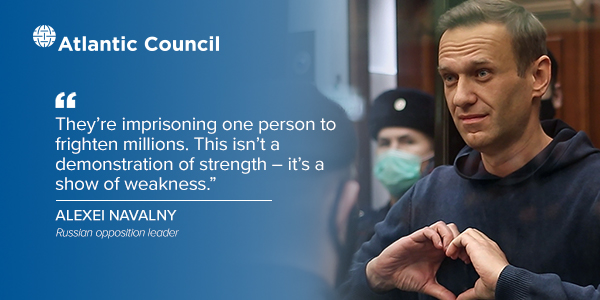
Atlantic Council top reads
Image: Chinese Vice President Xi Jinping speaks alongside his U.S. counterpart Joe Biden. REUTERS/How Hwee Young/Pool
